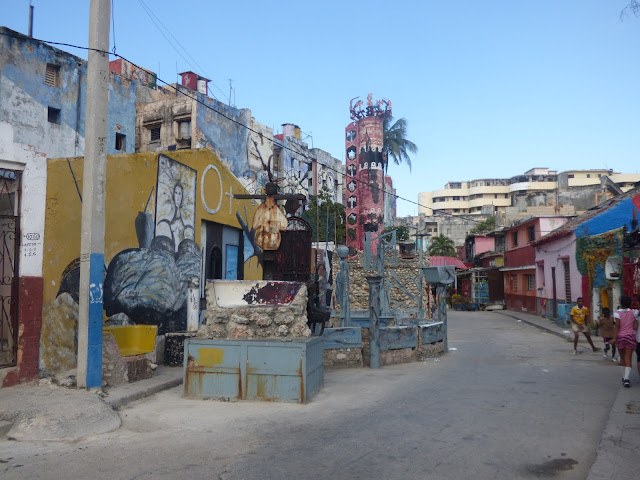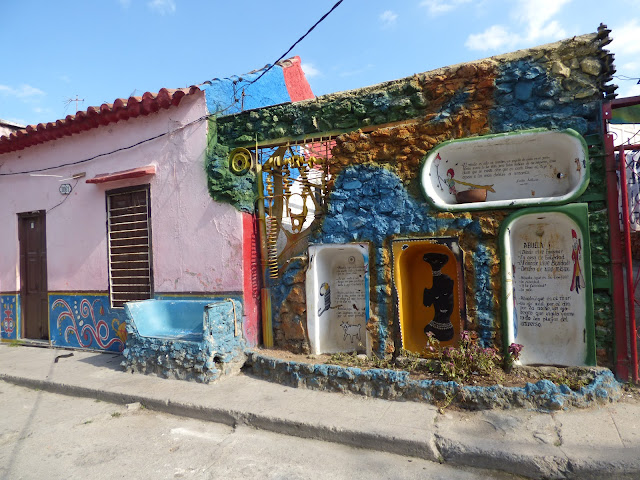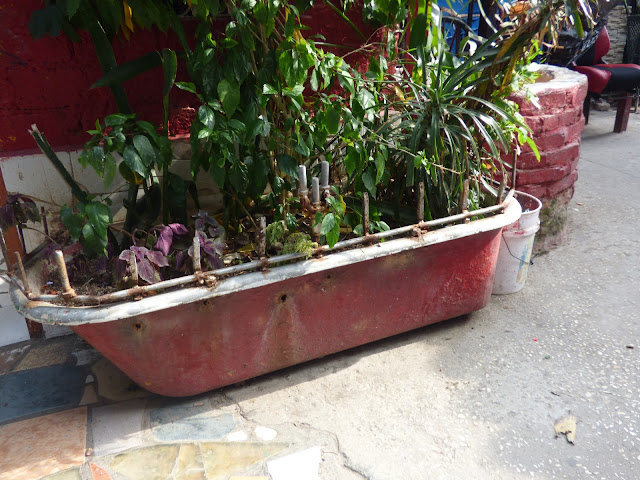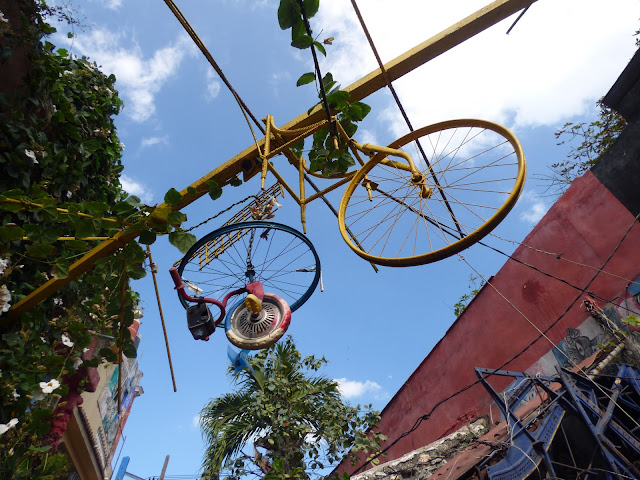 |
| Looking down Callejon de Hamel, from west to east. So far, almost a normal Havana street. |
Our time in Havana was pretty limited - two days - which wasn't enough time to squeeze in everything we wanted to do in the city centre, let alone head out to Fusterlandia, an arty neighbourhood in the suburbs. We still managed to get our dose of street art though, at Callejon de Hamel, a short back street that's been decked out with... well, everything the locals can get their hands on.
 |
| When bathtubs become art |
It's not that Callejon de Hamel isn't well-known - it appears in most decent guidebooks - but it's a bit out of town, meaning that fewer tourists get to it. I guess the London equivalent would be God's Own Junkyard - plenty of people know about it, but just being there feels a bit... edgy. We took a taxi from Parque Central (right near El Capitolio) and it only cost us 10 CUCs.
Our taxi driver drops us at the western end of the street, and for a while we have the place to ourselves. Like any other Havana back street, the paint on the walls is peeling, the road is riddled with potholes, and dusts blows all over the place.
A grandmother and grandaughter sit together on a bench, eyeing us up. On second glance, the bench is actually half of a bathtub. More bathtubs are embedded in the painted, pebbledash walls, poems written on their bases. Two young boys kick a football about, and off in the distance, a dog gives a hearty bark.
Think Gaudi meets Dali in a salvage yard, and you're in the right mindset. We venture further into what must once have been a bleak alleyway, now resembling an eclectic junkyard. A decorative metal cross towers 20ft above, its style reminiscent of the rooftop decorations of Casa Batllo, the metal much more sinister than Barcelona's playful stone. Naturally, the Cuban flag flutters nearby.
Halfway down the alleyway, a large porch covers the road, sheltering a group of men tinkering under the bonnet of a classic car. The scene is so stereotypically Cuban, it's hard to believe the whole thing isn't just one elaborate prank. But it drives home the realisation that despite its spot on the tourist map, this is a street where people live. Metal fences and gates in the high, colourful walls separate camera-wielding tourists from people's yard and living rooms. One nondescript gate swings open to reveal a bar, dark as a cave and populated entirely by locals.
A bicycle - or at least something that is the sum of the parts of a bicycle, but couldn't exactly be described as a whole one - is suspended above the street, roughly halfway down. To the left, bottles of Beefeater gin have been cemented into the walls, and to the right, someone's used a toilet as a flowerpot. It's all done without explanation and without ceremony. It's just the way things are around here.
There's something very Cuban about using everyday objects - bicycles, bottles, baths (and, yes, bogs) - in this way. The people here are used to recycling, not for environmental reasons, but because so many everyday objects are so hard to get hold of, that they've developed a unique ingenuity in repurposing objects in a way most people wouldn't even think of. And yet, like the rest of Havana, the street is unexpectedly green, plants squeezed in everywhere there's space.
As we near the end of the road, it becomes clear we've used the back entrance. Hoards of tourists, many with guides, are pouring in from the eastern end of the street. Vintage cars, now used to ferry tourists, cluster here. It turns out to be the more formal entrance, a stone arch reading 'Callejon de Hamel' bridging it. Just one look isn't enough, so we wander back down the street for a second - and later, a third - look. It really is a case of not being able to take everything in, and I certainly won't regale you with tales of everything I saw. Have a scroll through these photos instead.
From Callejon de Hamel, it's a 20 minute walk to the famous Hotel Nacional on the Malecon, where a cold drink and fantastic building await (plus, you'll be able to get a taxi back to wherever you're headed next, in our case, back to our hotel for a well earned rest).
 |
| Bathtubs have been reused for all sorts of things |
 |
| Gin, glorious gin |
 |
| They'll repurpose anything and everything |
 |
| The main entrance to Callejon de Hamel, at the eastern end of the street. |
Callejon de Hamel, Hamel e/ Aramburu y Hospital, Centro Habana. Entry is free.













This comment has been removed by the author.
ReplyDelete